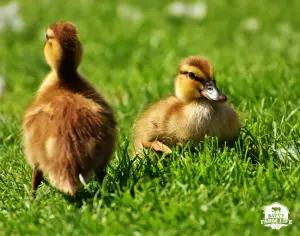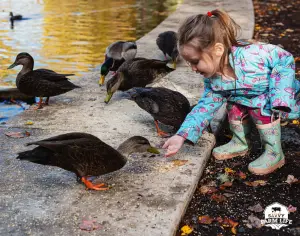How Ducks Show Affection
Though ducks aren’t the first animal people typically think of when bringing a pet into their home, ducks can actually be quite entertaining and loving creatures. They do require more upkeep than dogs or cats, but watching them splash around in a pool is worth it in and of itself.
So, how do ducks show affection? Ducks show affection towards humans in a variety of ways, including through physical contact, vocalizations, and playfulness. Depending on the breed of domesticated duck you pick and how you decide to raise your duck, ducks can be extremely affectionate pets to keep. Imprinting is another factor that will determine how affectionate a duck is.
Read on to learn all about the specific ways that ducks can show affection.
Ways Ducks Show Affection Towards Humans 
So we’ve already established that ducks, if you raise them right, can be loving pets, but how exactly do they show affection? Ducks show affection in mostly similar ways to humans, including through physical contact, playfulness, and vocalizations. Let’s dive into the more specific ways that ducks show their appreciation for their humans.
Cuddling
Much like cats and dogs, ducks love to snuggle up to you for some physical attention. If ducks feel safe and comfortable with you, they’ll climb up into your lap and snuggle up with your legs. They will also settle themselves near your extremities, like your arms and legs, for extra closeness.
Ducks are social animals, they like companionship whether it be with humans or their own species. Even in the wild, baby ducklings will cuddle with their mother duck or other ducks in their flock. Who knew that cuddling is one of the most universal ways we show affection!
Sleeping
Sleeping goes hand-in-hand with cuddling for ducks, so this is another surefire way that ducks show you that they care. Sleeping in the wild is an activity that leaves ducks in an inherently vulnerable position. Being prey birds, sleep is a time when they expose themselves to predators by letting their guard down. If you’d like to learn more about duck sleeping habits, check out my article “Where Do Ducks Sleep?”
Being that sleeping is when a duck is most vulnerable, it says a lot if your pet duck feels comfortable enough around you to fall asleep, especially when they fall asleep on you! When a duck falls asleep on top of your lap or nestled in your arm, it means they feel safe with you. This is just another way in which ducks showcase their very loving, warmhearted tendencies.
Playing
Ducks are quirky characters; they enjoy splashing around in the water, chasing shiny objects, and, generally, causing a ruckus. Their playful nature exhibits perfectly how ducks can make wonderful pets, just like cats and dogs.
They are entertaining to watch, and even more, fun to play with yourself. They are attracted to shiny objects, like mirrors and sparkly trinkets, as well as colorful toys. If you’re looking for a good option for a duck toy, simply check out the “parrot” section of your local pet store.
If your duck tries to engage you in playtime or brings you a toy to throw around for them, it’s a clear sign that your duck values your attention and cares about you. Even ducklings in the wild will rough house with each other to pass the time.
Vocalizations
Most readers know that ducks make a distinguishable “quack” sound, but are they aware that ducks have a whole other host of different noises that they make to communicate different feelings? In addition to aggressive sounds, ducks also have a noise that they make only when they’re happy or excited.
They will say “honk-honk-honk” very loudly at you if they’re riled up about getting a treat, seeing you after a long period of time, or just had their swimming pool replaced with fresh water. You can tell very quickly from the tone of this noise that they are happy because the “honks” come out loud and enthusiastic.
An increasingly promising sign that your duck likes you is if they make this noise while following you around the house. Just like humans in a new relationship, ducks like to be around their favorite person as much as possible.
Bobbing Their Heads
Wild ducks will bob their heads up and down at potential mates to signal their attraction. It’s a sign of “duck flirting” if you will. This head-bobbing involves a quick, up-and-down retraction of the neck and can be interpreted to mean a few different things. Domesticated ducks, for instance, also make this head movement, but usually because they are thrilled about something or someone.
Domesticated ducks will bob their heads up and down in joy, usually when they see you after having missed you for a while. Similar to how dogs wag their tails to signal their elation at their owner’s return, ducks will perform this head movement.
Gnaw/Nibble at Your Fingers
Though a duck nibbling at your fingers may surprise or shock you at first, it’s simply a sign that your duck appreciates you. The nibbling will typically happen during feeding time, especially if you hand feed your ducks.
Though gnawing can be mistaken as an accidental overstepping of the duck during hand-fed dinner time, it’s actually a common way that ducks show affection. Gnawing or nibbling on your fingers or toes can be a way that your duck says “thank you for feeding me!” and is a good thing. This means your duck loves and appreciates you, and it’s trying to show gratitude!
Asking to be Pet
Once again, just like more traditional domesticated animals, ducks love to be pet. Though each duck has individual preferences concerning where on their bodies they like to be pet, all domesticated ducks share an appreciation for this common form of affection.
How Imprinting Impacts Duck Affection 
At birth, every duckling imprints on the first object, person, or animal it sees. Most of the time, the first thing a duckling sees is its mother. When the duck imprints on its mother, it creates a lifelong attachment and bond to that parent. The duckling will now inherently follow her around, protecting itself from predators by staying close to her watchful eyes.
So, if ducks can imprint on their mother, can they imprint on us as well? The answer is yes! If you purchase duck eggs and wait patiently for them to hatch, the ducklings will imprint on you. This will create the same lifelong bond between you and your duck as it does for a mother duck and her baby, so proceed with caution.
Raising ducklings from birth is the easiest way to acclimate them to humans. Once they feel comfortable around humans, they will begin to show their love in all sorts of ways. However, a duck that is raised mostly around other ducks, and imprints on another duck, will most likely avoid human contact. This is important to remember if you’re interested in keeping ducks as more traditional, domesticated pets rather than as farm animals.
Best Duck Breeds to Keep as Pets
Not all duck breeds are created equal when it comes to the certain values that people prioritize in house pets. Some ducks, like the Muscovy, are naturally bad-tempered and don’t like to be picked up (sometimes they even squirt poop at you to avoid being held). However, with the right upbringing and roosting techniques, even ducks like the Muscovy can be trained to become domesticated. Just remember, “domesticated” is not equivalent to “friendly”.
Pekin ducks are the most popular choice for people looking to purchase a new fluffy buddy. These are the big, white ducks that look exactly like the duck from the Aflac commercials.
This breed of duck is naturally mild-mannered, calm, and friendly. They are also very fertile and can lay up to 200 eggs a year. In addition to this, the Pekin duck lives for between 9-12 years, an optimal lifespan for most people seeking a pet.
Do Ducks Remember Humans?
Let’s say, you have a duck, but you have to leave the duck in another person’s care for a month while attending to business across the country. Will your duck remember you when you return?
If you raised the duck from birth and it imprinted on you, then yes, the duck would definitely remember you when you returned. It might even get really excited to see you, like a Golden Retriever.
But, let me present a different hypothetical for you: you feed the ducks at your local pond every single day at the same time and place. If you went away for a month, would the ducks remember you when you came back?
Surprisingly, the answer is probably yes. Like most animals, food is one of the most effective ways to train a duck. This means that the ducks at your local park will begin to associate your face with the food you consistently feed them. When you came back from your trip, they’d likely still remember who you are due to these previous tasty encounters.
There’s plenty of YouTube video compilations showing that all ducks love to be pet and treated with physical affection. However, it may surprise some of you to find that male ducks, aka drakes, are typically more akin to being pet than female ducks are. Female ducks tend to be more playful and like to roughhouse with their owners more than drakes do.
I hope you enjoyed learning all about the ways that ducks show affection! You learn more about ducks here.
P.S. Save this article to your “Duck” board on Pinterest!

